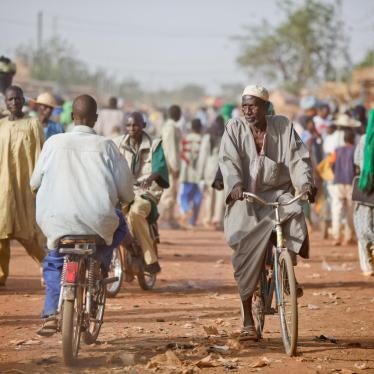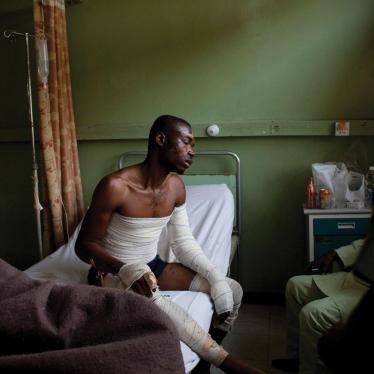The Ugandan government must fully investigate the alleged torture and electrocution of a security detainee in a government “safe house” in Kampala on May 4, Human Rights Watch said today. Human Rights Watch called on the Ugandan government to close all “safe houses,” which are unauthorized secret detention centers used by state security agencies.
Security agents in April detained Abdu Semugenyi, a 55-year-old businessman, along with another man, while they were driving in the village of Ntoroko, near Kasese in western Uganda. Security agents reportedly accused Semugenyi of being associated with the Allied Democratic Forces, a rebel group active in the late 1990s that the Ugandan government claims is still operating from bases in the neighboring Democratic Republic of Congo. The two men were transferred to Karugutu barracks of the Uganda Peoples’ Defense Force in western Uganda and from there taken to a safe house maintained by the Joint Anti-Terrorist Task Force in Kololo, an upscale neighborhood of Kampala filled with foreign embassies. The authorities first denied holding Semugenyi, but in press reports they later claimed that he was killed while trying to escape.
“The anti-terrorist force runs a safe house in an upscale Kampala neighborhood where they torture suspected rebels and dissidents. And in this case, they allegedly killed a man by electrocuting him,” said Jemera Rone, East Africa coordinator for Human Rights Watch. “Abdu Semugenyi was not charged with any crime, the authorities denied he was in custody, and now he’s dead.”
Other individuals detained in the safe house with Semugenyi told Human Rights Watch they witnessed him being tortured, and said some of them were tortured as well. One said that Semugenyi was electrocuted to death on May 4 and that he died crying for water. His body has not been recovered by his family.
“The authorities concocted a story that Semugenyi was ‘killed while trying to escape’ from a safe house they had no right to hold him in,” said Rone.
Human Rights Watch called on the Ugandan government to conduct a full and impartial criminal investigation into Semugenyi’s death in custody and prosecute all those responsible for his death. The government should also promptly hand over Semugenyi’s body to his family for proper burial and provide financial redress for his mistreatment and death.
“Secret ‘safe houses’ are not part of Uganda’s legal detention system,” said Rone. “But the security and intelligence forces keep these illegal ‘safe houses’ to hide the identities of those held for secret interrogation.”
In the past several years, Human Rights Watch and other human rights organizations have collected and published many accounts of people tortured in “safe houses,” including in the Kololo facility run by the Joint Anti-Terrorist Task Force. According to these reports, government agents detain individuals whom they suspect of being associated with rebel groups, such as the Allied Democratic Forces and the People’s Redemption Army, as well as other political dissidents and treason suspects, to safe houses for interrogation for indeterminate periods of time.
For example, a woman who was allegedly connected with Semugenyi, and was also charged with treason for subversive activities between 2004 and 2006, appeared in court nursing wounds she said were from torture by her government captors. The suspects are usually later transferred to Central Police Station in Kampala, where they may be charged with a crime or spend days or weeks before they are released.
In a letter dated June 21, Human Rights Watch asked the Ugandan government to comment on the circumstances of Semugenyi’s death, but received no response.
International human rights law, by which Uganda is bound, requires that a government investigate allegations of serious human rights violations. The United Nations Principles on the Effective Prevention and Investigation of Extra-Legal, Arbitrary and Summary Executions call upon governments to conduct “thorough, prompt and impartial investigation of all suspected cases of extra-legal, arbitrary and summary executions, including cases where complaints by relatives or other reliable reports suggest unnatural death.” Ensuring that police, military and security officers are held fully accountable for any crimes that they commit is necessary for respect of human rights as well as for the maintenance of professionalism in the security and military intelligence forces.
Human Rights Watch called on the Ugandan government to cease the use of “safe houses” and torture, and to detain and process suspects in accordance with international human rights standards.






